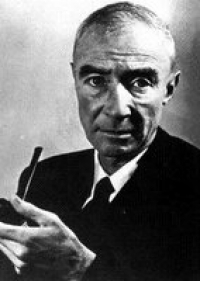Oppenheimer, Julius Robert
Julius Robert Oppenheimer (1904–1967), a Jewish-American physicist, was the scientific director of the Manhattan Project, the World War II effort by the U.S. to develop nuclear weapons at the Los Alamos National Laboratory in New Mexico. There, Oppenheimer collected a group of the most brilliant physicists of his day, which included Enrico Fermi, Hans Bethe, Richard Feynman, Edward Teller, Robert R. Wilson, and Victor Weiskopf. The collaborative efforts of the scientists at Los Alamos resulted in the world's first nuclear explosion at the Trinity Site at the Alamogordo Bombing Range in New Mexico on July 16, 1945. After the war, Oppenheimer chaired the U.S. Atomic Energy Commission. He opposed developing an even more powerful hydrogen bomb, a stance that turned the political climate against him. In 1953, at the height of the U.S. anticommunist movement, Oppenheimer was accused of having communist sympathies. Although he was not found guilty of treason, his security access was taken away and his contract as adviser to the Atomic Energy Commission was terminated. In 1963, President Lyndon B. Johnson presented Oppenheimer with the Enrico Fermi Award of the Atomic Energy Commission.
